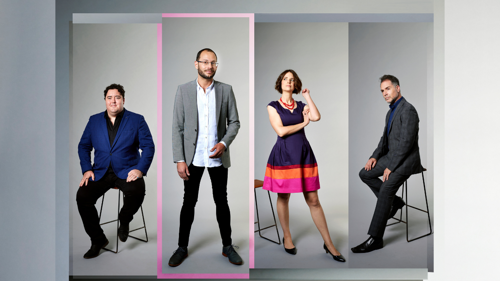Songs of Rosa Mystica – The Song Co. singers call this program "extreme"
“It looks like the plans for a nuclear weapon or something on the page!” – Jack Symonds on Elliott Gyger's work "Ficta"
Songs of Rosa Mystica guest director Jack Symonds:
This – Songs of Rosa Mystica – program represents what I love about vocal music: the unique ability of the human voice to illuminate poetry and text in completely fresh and imaginative ways.
It is built around two of my favourite living composers, the Australian Elliott Gyger and Kaija Saariaho from Finland. They each have an instantly identifiable approach to the voice in harmony.
Saariaho weaves a hallucinatory spell from her complex, resonant chords (aided here by subtle electronic transformations), coloring the vivid poetry of Friedrich Hölderlin in a way no previous composer imagined. Far from the usual German Romantic tradition encountered with this writer, Saariaho finds a very French sensuality in his gnomic words.
Elliott Gyger's Ficta is, quite simply, one of the most virtuosic things I've ever encountered for six unaccompanied voices to perform. An early work by this major Australian composer written while he was in-residency with The Song Company in 1994 (and performed only once until now!), Gyger sets a 15th century text describing the 'rules' for writing musica ficta alongside the text from the 'Prize Song' from Richard Wagner's Meistersinger (an opera where the rules of songwriting is debated at great length!) and a poem by Ern Malley about the 15h century artist Dürer.
This three-dimensional melding of texts about art creates an intricately layered piece where every singer inhabits a different refracted stylistic 'tick' from the history of vocal music... all in under 20 minutes! Elliott's music demands much of performers and audience but is some of the most rewarding I've experienced – I can't wait for the thrill of presenting it to audiences this year. Give yourself over to this masterful interweaving of music and history by an Australian legend.
Finally, a sequence of music illustrating the quirky genius of Gerard Manly Hopkins, the great 19th century English visionary, iconoclastic virtuoso poet who bent the sounds of the English language to his unique poetic take on nature, God, and humanity’s relationship with them both. Far in advance of many twentieth century poets who conducted similar experiments on the form of words, Hopkins supercharged language with a unique pattern of accents, rhythms, rhymes and collisions of sounds that I find musically irresistible.
The content and expression for which he is most known is a kind of radiant, ecstatic positivity uniting the wonders of the natural world to our divine perception of it. Benjamin Britten's A.M.D.G and his great contemporary Michael Tippett's The Windhover illustrate this with rhythmic verve and spectacular, pinpoint madrigal technique. However, Hopkins's late poem Spelt from Sibyl’s Leaves is a much more apocalyptic vision of heaven and hell, containing bleak ruminations on the likely fate of most of humanity: a desolate Dies Irae.
As I was setting this poem, I found the words seeming to grind against each other, warping and buckling under the intense pressure of Hopkins’s dark ruminations. I have sought to amplify the linear arrangement of words in the poem by drawing out the correspondences of vowel/consonant sounds and language forms. Six voices often form an unruly, heterophonic unison that is further augmented by live electronics which take the percussive points of vocal contact in Hopkins to their logical extreme. I have attempted to give Hopkins’s vision ‘linear form’ in time by distorting the natural rhythm of his sonnet, attempting a three-dimensional representation of the ‘inner sound’ of the poem itself. These are the first performances of my work.
– Jack Symonds
Songs of Rosa Mystica will tour from 9-15 June to Sydney, Canberra and Melbourne and will also be broadcast online.



